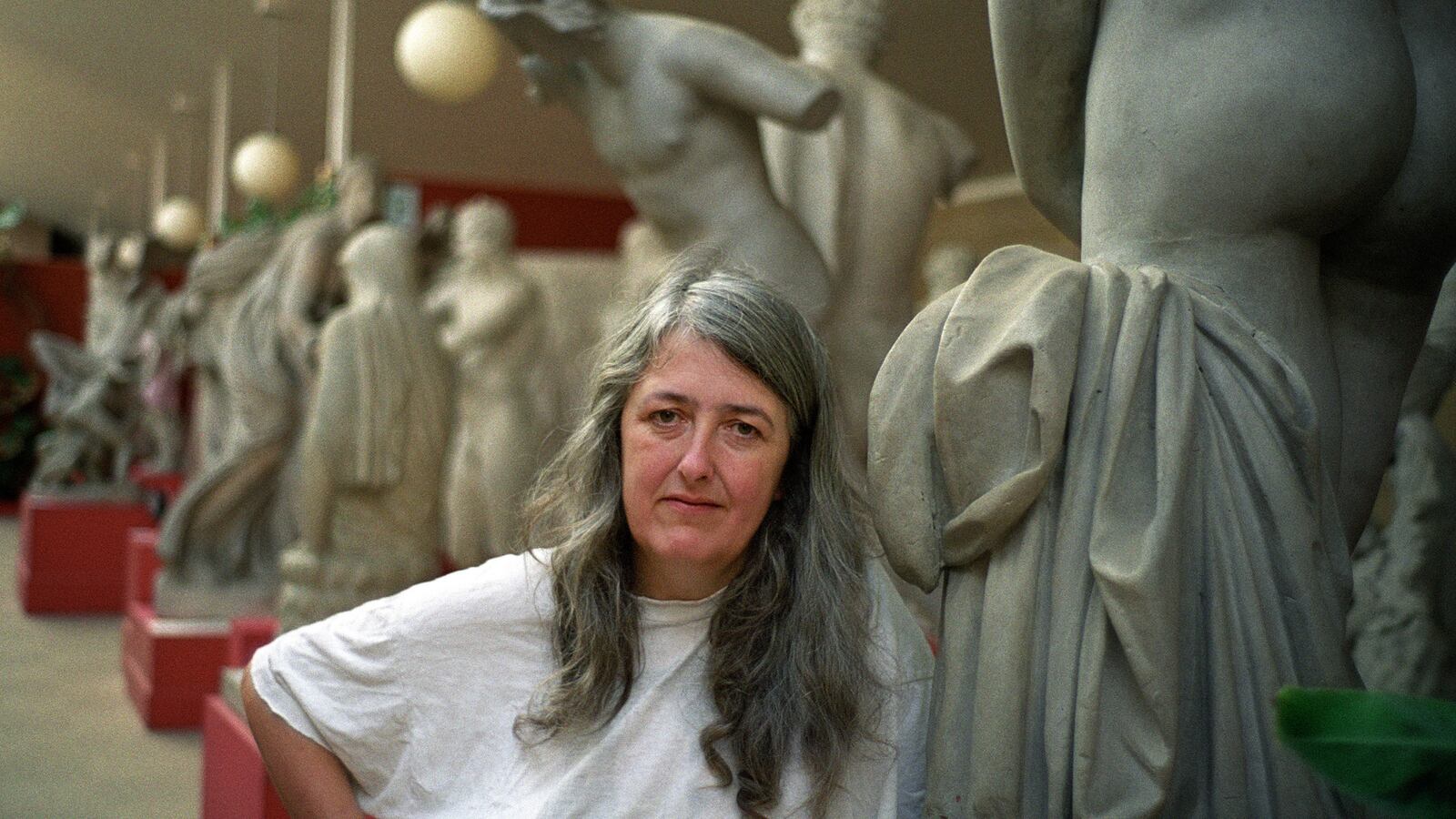Earlier this fall, on the rustic campus of Bard College in upstate New York, a figure clad in bright yellow cloak and shoes described, to a spellbound audience, the domestic life of an ancient Roman ménage à trois. Both the flamboyant color and the vivid material—an epitaph extolling the virtues of Allia Potestas, a woman of the high Roman Empire who kept a tidy home while generously servicing both men she shared it with—are typical of Mary Beard, the cheekiest of modern classical scholars and “a wickedly subversive commentator on both the ancient and the modern world” (as her mini-bio claims in the Times Literary Supplement, where she is both Classics editor and blogger).
“[Allia] was always the first up and the last to bed of the trio, we’re told—do things ever change?” Beard wrote in a British Museum blog that accompanied Meet the Romans, the 2012 BBC television series she hosted. A note of empathy, perhaps even sisterhood, comes through clearly in Beard’s treatment of this overtaxed woman, who, despite her last name— Potestas, or “Power”—had little power or agency (Beard surmises she was an ex-slave). Since joining the Classics faculty at Cambridge four decades ago—a lone female scholar in that august body, and one of few active in the male-dominated field of Roman imperial history—Beard has specialized in bringing marginal or disenfranchised Romans, and women in particular, to vivid life for a wide modern readership.
This month, as her general survey of Roman history, SPQR, appears, Beard takes another giant step down this populist path. The book’s title is taken from the Latin acronym for Senatus Populusque Romanus, “the Senate and People of Rome,” found on decrees and monuments of the old Roman Republic (and still seen today on Roman manhole covers). It is these bodies, rather than the Caesars who usurped their powers starting in the late-1st century B.C., that closely concern Beard; only one emperor in a long list—Augustus, the founder of the line —gets serious treatment in the book. To people like Allia Potestas, Beard asserts, the reigning Caesar was merely a face on the coins they had too few of. The stories that matter to Beard are not those found not in the great historians—Tacitus, Suetonius, and Cassius Dio, all of whom were preoccupied by court politics and palace intrigue—but in more obscure corners where researchers seldom probe.
Beard’s passion for sleuthing was on full display in her Bard lecture series, entitled “Last Words: Roman Epitaphs and Their ‘Afterlife.’” In these talks, Beard dealt primarily with funerary inscriptions—capsule biographies, in her view, of people who, in many cases, left no other mark on the historical record—and with tomb monuments. She took particular delight in the grand tomb (still largely intact) of a baker named Eurysaces, a structure designed to resemble the baking oven from which he had evidently amassed a large fortune. This proudly self-made man—whom Beard placed first in a recent list of her 10 favorite Romans, compiled for The Guardian—proclaimed in his inscription “This is the tomb of Marcus Vergilius Eurysaces, the baker and contractor,” followed by the single Latin word apparet. Scholars have puzzled over this anomalous word, but Beard boldly translates it as a winking question referring to the tomb’s shape: “Get it?”
Jests and wit, especially the irreverent kind, fascinate Beard; her last book before SPQR was Laughter in Ancient Rome: On Joking, Tickling, and Cracking Up. That 2014 study opened with a characteristically Beardian anecdote, recorded by Cassius Dio, the Roman historian, about his own times. It seems that one day in the Colosseum, Dio was seated among a group of senators watching the reigning emperor, Commodus—memorably played by Joaquin Phoenix in the film “Gladiator”—put on displays of his gladiatorial prowess. At one point, Commodus beheaded an ostrich, then menacingly displayed its severed head, and his own bloody sword, to the senators seated before him. Faced with this ludicrous threat, the spectators felt an uncontrollable urge to laugh; Dio, in the end, had to stuff his own laurel-wreath garland into his mouth to suppress it. Beard clearly enjoys Dio’s inability to take the high and mighty as seriously as they take themselves; it’s an ironic stance she often adopts herself. “There is something curiously gratifying,” she notes in an aside, “about a story that casts the excesses of Roman imperial power as the object of laughter.”
Her quick wit, together with her vibrant oratorical style and her fearlessness in front of cameras and microphones, have brought Mary Beard as close to celebrity as any Classicist since Oscar Wilde has come. She features in numerous BBC documentaries (a new one is in production) and writes frequently for the New York Review of Books; the Times Literary Supplement publishes her off-the-cuff musings in a regular segment called “A Don’s Life” (her TLS and NYRB contributions have been anthologized as It’s a Don’s Life and Confronting the Classics). She willingly opines on matters that go beyond the academy and into the realm of modern politics. In a long essay last month in The Wall Street Journal, Beard addressed the issues Europe faces as migrants stream toward it from the Middle East and Africa, finding a template for openness in the act by which emperor Caracalla, in 212 A.D., granted full citizenship rights to all free subjects of Rome.
Beard has paid a price for being so much in the public eye. Trolls and Internet haters, seemingly angered by a highly educated and self-assertive woman, have often sent threats and abuse her way; a prominent British TV critic, A.A. Gill, attacked her personal appearance in print. Such incivilities featured prominently in Rebecca Mead’s New Yorker profile of Beard, “The Troll Slayer,” which made clear that Beard remains uncowed and eager to give as good as she gets. Even readers who post critical reviews on the Amazon pages of her books have, on occasion, been surprised to find replies from the author herself appearing in the “comment” field, with suggestions as to how they should rethink their negative stance.
Beard is a tough reviewer herself, and many classicists, myself included, have felt the sting of her barbs. But such bluntness is a welcome redress to the back-patting and soft-pedaling that afflict so many modern book reviews. She pulls no punches, but also makes it a point of honor, as she once explained to me, to never put anything in print she wouldn’t say to the author’s face. (That restriction, coming from someone so brashly outspoken, may offer little comfort to those who come within her crosshairs.)
With the publication of SPQR, Mary Beard caps off a half-century of studying much of what has been written by, or about, the Romans. Many modern readers, and many Romans—including Eurysaces, the self-important baker, and Allia Potestas, the gracious mate of two men’s beds—are glad she’s here.






